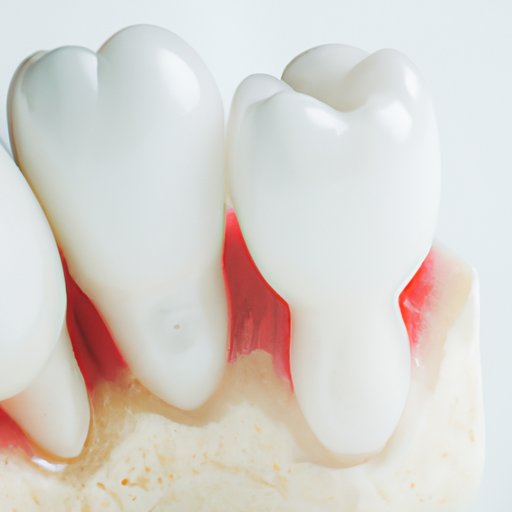I. Introduction
Gum disease, also known as periodontal disease, is an infection of the gums that can lead to tooth loss and other serious health issues. Gum disease affects approximately 47% of adults over the age of 30 in the United States, making it a prevalent issue that requires attention. Taking preventative measures and seeking treatment in the early stages can help prevent further damage to the teeth and gums.
II. Preventative Measures
One of the best ways to fix gum disease is by taking preventative measures to avoid getting it in the first place. Here are some simple steps you can take to reduce your risk of developing gum disease:
Brush your teeth at least twice daily – Brushing your teeth regularly can help remove plaque and debris from your teeth, preventing harmful bacteria from forming in your mouth.
Floss regularly – Flossing can help remove food particles and bacteria from between your teeth and gums, where your toothbrush may not reach.
Avoid tobacco products – Smoking and using other tobacco products can increase your risk of developing gum disease, as it can damage your gums and teeth over time.
Use an antiseptic mouthwash – Mouthwash can help kill bacteria in your mouth and prevent plaque buildup, reducing your risk of developing gum disease.
III. Use of Dental Probiotics
Dental probiotics are beneficial bacteria that can be used to reduce harmful bacteria in your mouth, promoting healthier gums and teeth. These probiotics work by introducing good bacteria into your mouth, which can fight off harmful bacteria that can lead to gum disease. Studies have shown that using dental probiotics can help reduce the severity of gum disease and promote better oral health. Speak to your dentist about incorporating dental probiotics into your oral health routine.
IV. Scaling and Root Planing
Scaling and root planing is a deep cleaning treatment that is used to remove plaque and tartar from the gums and teeth. This treatment is recommended for patients who have moderate to severe gum disease. During the procedure, your dentist or hygienist will use special tools to remove the buildup of plaque and tartar from your teeth and gums, helping to prevent further damage and promote healing. This treatment is often done in multiple sessions and may require anesthesia.
V. Dental Implants
Dental implants are artificial teeth that are surgically placed into the jawbone. They can help prevent further damage to gums and teeth by filling gaps caused by missing teeth. Dental implants also support existing teeth, promoting better oral health. Implants are a great option for patients looking to replace missing teeth while also fixing gum disease issues. Consult with your dentist to determine if dental implants are right for you.
VI. Antibiotic Treatment
Antibiotic treatment may be recommended for patients with moderate to severe cases of gum disease. Antibiotics can help reduce the number of harmful bacteria in your mouth, promoting better oral health. This treatment is typically used in conjunction with other treatments, such as scaling and root planing, to ensure the best possible outcome.
VII. Treat Gum Disease in its Early Stages
It is important to recognize the early symptoms of gum disease, which include bleeding gums, bad breath, and swollen or red gums. Seeking treatment in the early stages can help prevent further damage and prevent tooth loss. Neglecting to treat gum disease can lead to more serious health issues such as bone loss and heart disease.
VIII. Consult your Dentist
Regular dental visits are crucial in the prevention and treatment of gum disease. During your visit, your dentist will examine your teeth and gums to detect any signs of gum disease. They will then recommend the appropriate treatment options. Be sure to schedule regular dental visits to ensure the best possible oral health.
IX. Conclusion
Gum disease is a prevalent issue that requires attention. Taking preventative measures such as brushing your teeth twice daily, flossing regularly, avoiding tobacco products, and using an antiseptic mouthwash can help reduce your risk of gum disease. Consulting with your dentist and seeking treatment in the early stages can help prevent further damage and promote better oral health. Remember to speak to your dentist about incorporating dental probiotics or dental implants into your treatment plan.
